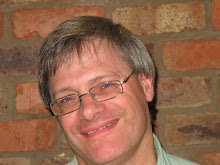Tuesday, December 05, 2017
Verdi's Falstaff
In an opera house, there are sumptuous sets and the cast have the run of the stage, while the orchestra are relegated to the orchestra pit. Here the orchestra took their usual place, the scene changes were suggested by images projected onto the back wall, and the cast sung mainly from the front of the platform, though they also used the stall aisles and choir benches on occasions. From our second row seats, we could almost reach out and touch them.
While Bryn Terfel was excellent in the title role, and the most eye catching name, Rebecca Evans and Anna Dowsley were wonderful merry wives, Wanda Franek was a great bearer of messages, and the two young lovers, Murat can Guvem and Barbara Massaro are worth looking out for.
Opera in Italian is not the easiest to follow, but we were helped by reading the plot summary in the program notes beforehand, a screen at either side showing the English translation, but mainly by the expressiveness of the singers. they were real performers.
They added plenty of their own humour to the score. The kitchen utensils in Falstaff's hat serving as horns for the forest scene was a particularly fun touch. Vasily Petrenko is well able to add an element of humour to his conducting; I did catch some, but found myself watching the singers more.
Verdi wrote only two comic operas, one, not well received in his youth, and then this a masterpiece in his old age. I particularly enjoyed the first scene in Act 3; at the start Falstaff is dejected, but his spirits rise as he sings an ode to the joy of wine. The music expresses it so well.
Monday, August 28, 2017
The Compost Bin
1. First I swept up the space in front of the bin. We had a broken window pane a while back, and while most of the glass fragments had been cleared away, there were still a few that needed sweeping up.
2. I edged the bin forward a few inches, and opened up the door at the bottom, cleaning up the soil from the edges, so that it goes back cleanly.
3. Using a spade, I dug out some compost from the bottom of the bin. I took out a wedge, up to the top of the door at the front, making sure I got to the back at least at the bottom.
4. I then cleaned up the faces where the door fits, and then put the door back in place. I was lucky, the remaining compost did not fall down to fill the void until after I fitted the door, and secured it with ties.
5. Taking three or four spadefuls into a tray, I lifted it up to table height, and took out any large pieces that did not immediately crumble in the hand.
6. The twigs went to one side to be reused. The twigs help the oxygen get to the composting process.
7. Pieces of slate are ready to wash and put back onto the slate path.
8. I threw away everything else I took out: nested pieces of egg shell, peach stones, avocado skin, pieces of plastic. There were other chunks of unidentified material that did not immediately crumble. Although tea bags did not compost that well, we will continue to compost them, as the tea itself seemed to compost okay.
9. I ended up with one and a half tubs of compost, which we will cover with plastic sheets to keep the compost dry before we use it.
10. Finally I tidied up, passable well.
Sunday, April 23, 2017
Story of your Life
This is the short story on which the 2016 film Arrival is based. It is much better than the film.
"The only way to learn an unknown language is to interact with a native speaker." When alien craft orbit the earth and open up a number of communication windows around the world, the military are quite cagey about the information they share, but the colonel takes the advice from Dr. Louise Banks, and she is paired with a physicist and tasked with learning the alien language and learning what physics they can teach us.
The book is not so much about language as knowledge of the future. The aliens know the future, and so are very patient as Louise learns their language. But as she does, she gains knowledge of the future.
This is not liberating, but is instead very restrictive. She is precluded from making actions that deviate from what she knows of the future.
The book is addressed to her unborn daughter, and describes incidents of her life from childhood youth to untimely death.
A thoughtful short story, much better than the film with its nonsense atmospherics and artificial climactic finish.










